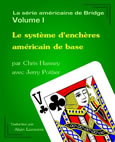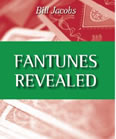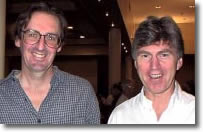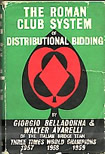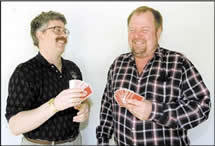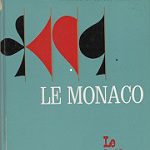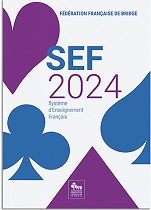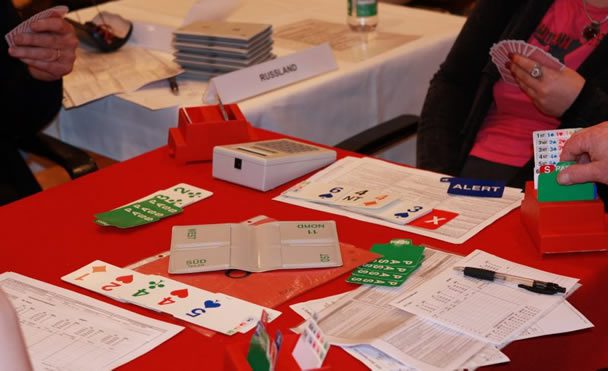
Systèmes de Bridge, Systèmes naturels, Acol, Trèfle fort,Précision, Forcing Pass, Systèmes peu connus, Systèmes français, Evaluation des mains
Systèmes de Bridge
Collections
Bidding System on Wikipedia
Bridge Bidding systems on Bridge Guys
Bridge Bidding Systems on Bridge Bum
Bridge Systems on BBO
Bridge Systems by David Morgan (Relays)
Bidding Systems by Graeme Williams
Popular Bridge Bidding Systems on Bridge Hands
Systemothèque , banque de Feuilles de conventions par JP Rocafort
Systèmes des championnats du monde et d’europe sur E Cats
videos
System on with Sjoert Brink
System on with Andrea Manno
System On with Joe Grue
System On with Krzysztof Martens
Philosophie
David Collier’s posts on Bidding systems and Theory
Le Choix d’un Système par Jean Pierre Roquafort
Typologie des enchères par Jean Pierre Roquafort
Interview de Thomas Bessis a propos des systèmes, sur Big Bang Bridge,traduit et adapté par Daniel Delestre .
What is the bridge system that has most impressed you? by Barry Rigal on Bridge Winners
“Mats Nilsland takes a look at everybody’s “standard system “ and shows how you can transform this natural base into an effective, modern bridge system.All ideas have been tested in real life successfully”
System archetypes by Greg Earnest
Building a Bidding System, Book by Roy Hugh
How complicated should your system be ? by Bob Crosby
Building a practical System by Liam Milne
How much has Bridge changed in 75 years by Jeremy Dondy
Construire et travailler son système avec le Partenaire Diaporama par Claire Martel à visionner sur You Tube
BridgeDocs BridgeDocs provides powerful tools for structured learning and collaborative bridge system development
A propos de Bridgedocs sur GreatBridgelinks
European Bridge league Systems policy
Bold by Phil Roquemore
The mission of Project BOLD is to develop an exciting new bidding system that dominates the modern bridge metagame,
Systèmes- Systems
Why Four Card Majors ? by Marvin French
Debate A strong Club system is much better than Acol by Jeremy Dondy and Chris Jagger on EBU December 2009
On the Structure of Natural Bidding System by Bert Beentjes
Naturel Bidding in Bridge, the sevenfold way by Johannes Koelman
What does Natural mean ? by David Collier
Les systèmes étrangers par Alain Lévy Dossier As de Trèfle
Systèmes artificiels sur Roquibridge
GIB: Steps Toward an Expert-Level Bridge-Playing Program Matthew L. Ginsberg
World Championship system Review by Glen Ashton . A fantastic work !
Everybody needs a coach by Krzyzstof Martens.
Norberto Bocchi, the Big Bang interview Norberto talks about his bridge system and the importance of vulnerability
Systèmes naturels
Standard American Ancestors
Standard American Bridge par Richard Pavlicek
SAYC Standard American Yellow Card
System of choice for many novice players on the internet. Also used as a pickup system by many from around the world.
A Mini book on Standard American by Noble Shore
What’s Standard ? Is Standard American a myth by David Lindop
ACBL SAYC System Booklet
Standard American Yellow Card Revised and Expanded by Mark London Further Revised by Wayne Burrows (Jan 2007)
2 over one System
System very close to Standard American dates back to 1958 with Alvin Roth and Tobias Stone system . Edgar Kaplan and Alfred Sheinwold. followed with their own system. Features from the Roth-Stone system were also adapted to the 2/1 system we know today. from Bridge Hands
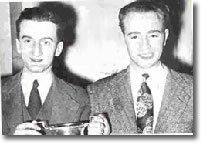
Roth Stone System developed by Alvin Roth and Tobias Stone in 1953 by Graeme Williams
Kaplan Sheinwold updated by Edgar Kaplan
2 over one System on Bridgehands
Unifying 2/1 GF by Larry Cohen
Improving 2 over one Game force by Fred Gitelman
2 over one Game force system by Neil H. Timm PDF
The Great 2 over one debate by Bob MacKinnon
Eastern Scientific by Richard Pavlicek . Quite similar to the Standard American, also known as Walsh system
Pavlicek System PDF
BWS Bridge World Standard (BWS) encapsulates common American expert practices
Bridge Bulletin Standard
bidding system used by the panelists for It’s Your Call. It is loosely based on popular Standard American and 2/1 treatments commonly used by duplicate players in North America. It is more than SAYC, but less than a full-blown 2/1 system.
.
Acol Système d’enchères anglais
Standard English Acol
Acol Système d’enchères anglais par Michel Heger
Convertir l’Acol en SAYC par Michel Heger
Biedermeijer – Dutch Acol and Dutch Doubleton Compared to SAYC by Helene Thygesen on Bridgeguys
Autres systèmes naturels
Australian Bridge Standard on australianbridge.com
EHAA or Every Hand An Adventure.From the late 50’s.
Agressive, natural style of bidding that combines mini notrump openings, wide-range weak two-bids, and a Goren-like four-card major approach into an easy, effective, and fun way to bid. It is not a highly specified system, but rather, like Standard American or Acol, a general style which can be played in numerous variations. Quoted from Eric Landau.
ETM Everything That Matters System by Glen Ashton
ETM adjustment to allow for a strong forcing one Heart opening by Glen Ashton
ETM Savage A Bidding system for Bridge Barbarians by Glen Ashton
ETM Polar Club A top level Bridge System by Glen Ashton
Finnish Standard Bidding System on Jukka Korpela’s Bridge Page
Romex Bidding System
Science Simply Scientific Four Card Majors
Standard Dutch Bidding System, Now five cards Major by Tjoen Oei
We Bad, a scientific five cards major system played by Don Weiner and Dave Babcock
Fantunes
Fantoni_Nunes system by Daniel Neill
Simplified Fantunes
Ouverture de 2C Fantunes d’après Gérard Sauvet
Ouverture de 2P Fantunes d’après Gérard Sauvet
Le Trèfle fort
Big Club Standard by Howard Schenken on Bridge Bum
ETM Big Club express by Glen Ashton
Eastern Mysticism by Elliot Thomas Grant employs best elements of a strong club opening, a weak notrump, 2-over-1/forcing NT, and the Law of Total Tricks
Millenium Club from the book by Lyle Poe, notes by Daniel Neill
The Composite Club by Bill Hodgkiss
Hilversumse Klaveren a Big Club system by Michiel Geelen and Jan Veerbeek 2021
MOSCITO short for Major Oriented Strong Club originally invented by Paul Marston and Stephen Burgess
Symmetric relay system , Moscito versions and variants, by David Morgan
Scamp system, Nick Hughes’ Moscito variant
Terrorist’s Moscito adaptation by Bo-Yin Yang
Moscito Byte (Moscito for GIB)
Cobra computer-designed bridge bidding system developed by E. T. Lindelof and similar to Schenken Club
Toad Club by Jim Griffin
AUC, Unassuming Club , member of « intermediate clubs » that includes Vienna System, Roman Club, Polish Club, New South Wales Club, Bogota Club, and Power System
Unassuming Club by Don Varvel
.
Weak/Strong Club System

Magic Diamond light
Livorno or the Leghorn Diamond System developed by Benito Bianchi and Giuseppe Messina on Bridgeguys
Strong Diamond System by Noble Shore and Mike Gill
System Dutch Doubleton used by the international Dutch team
Tangerine Club , ClementinKlover in swedish by Jan Eric Larsson a simple, systematic version of a weak/strong 1 Club and light 4 card suit openings.
ETM Storm by Glen Ashton ,big one club opening
together with a one diamond opening to show minimum opening hands with four or more spades
Bocchi_Duboin system Notes on Ecats
A Bocchi Duboin System review by Paolo Garrisi
Polish Club by Greg Matula
Artificial 1T/1K Systems
Roman System by Bernard Utner based on Giorgio Belladonna’s « nuovissimo fiori romano » with some enhancements and modernisations.
Système d ‘enchères de précision
Precision Club, most common system used in the USA after Standard American and Two Over One first used on the international stage by the Taiwan national team in 1970. Following their success using the system in the 1970 and 1971 Bermuda Bowls, Precision exploded onto the world stage when the legendary Italian Blue Team adopted and refined it as Super-Precision. The Blue Team’s successes during the 1970’s using Precision brought the system prominence and prestige. Although its global popularity will never rival that of Standard American, 2-Over-1 or ACOL, it is generally reckoned to be more efficient that any of them and is the foremost Strong Club system in use today. Many modern experts, including multiple World Champions Jeff Meckstroff and Eric Rodwell use it as the basis of their system ….. from Oliver Clarke Precision Club page
Articles about the Precision Club Bidding system on USA.bridge.com
Precision and Super Precision by Giorgio Belladona and Benito Garozzo from Tutto Bridge
Precision Bidding Today on Radha Verma ‘s Page
The Revision Club System 4th Ed. 2009 by John Montgomery
.
The K-Club, a precision system played in Kingston, Ontario by Ken Allan
The K-D Club based on the K-Club but employs the full panoply of Italian bids PDF by Ken Allan precision-like system, featuring light limited openings – weak notrumps, and an artificial forcing bid
Mellon Diamond by Adam Meyerson and Noble Shore
Symmetric Relay System similar in many ways to Precision Club but using relay continuations over all of the openings.
Professor Roy Kerr Symmetric Relay System modified by Richard Hills 2000
Symmetric Relay System by Ljudmila Kamenova
TOSR 4-Card Transfer-Oriented Canapé Symmetric Relay System on Mark’s Bridge Bidding Systems
Volmac Precision developped by Garozzo for the Dutch team on Daniel ‘s System page
ULTRA CLUB Relay by Dwayne Hoffman & Larry Lowell
Ultra attempt by John Lowenthal and Phillip Martin to improve the Ultimate Club.
SuperSpades by Mark Donovan
Super Spade in Bridge Magazine‘s Bidding Challenge.
Autre systèmes de relais par David Morgan
Forcing pass systems
Forcing Pass Systems by Jan Eric Larsson and Ben Cowling
SCRAPE Strong Pass Relay Ever Avoiding Defending variation of Moscito known as SPREAD by Mark Abraham
The Way Forward British symmetric variant
The Way Forward by Todd A. Anderson
IMPrecision symmetric Precision variant developed by Sam Ieong and Adam Meyerson.
Dejeuner, a forcing pass system with symmetric relays by Todd A Anderson
SuperLambda Polish Forcing Pass system
Suspensor on Mark Abraham
Three-times-three by V. Brushtunov
T Rex opening bids are highly multi-way with many different relay structures on Mark’s Bridge Bidding System
Trident, a Forcing Pass system by Ken Allan
DONT System by Mark Donovan
Säffle Spade by Einar Bergh and Pontus Svinhufvud
Systèmes étrangers peu connus
Ambra System written by Garozzo for the italian junior team
Ambra on Bridgeguys
Artic Club by Gordon Bower
The amBIGuous DIAMOND system by Marvin French designed for matchpoint bidding, permits, four-card major opening bids.
CatoMult System Notes CAnape-Take-Out-MULTi! by Mark Abraham
Douche club by Mark Abraham, Griff Ware and Daniel Geromboux
Electric Ant by Daniel Skipper system I designed after getting annoyed at losing pairs events because I sat the wrong direction, didn’t get any points and got bad board after bad board because my opponents did normal stuff.
Lf Bridge system (4 card)
LH Blue Card with very light openings by Liu Hong
LH System by Liu Hong on Bridgeguys
Martens Books by Vang
M.A.F « Majors Always First » or: « Multis are favorite » by Chiel Verwoest .
MidMac bidding system devised by Jon Drabble
.
Mox,21 century bridge, by Mihail Filipov Nedyalkov, Bulgaria, system features some themes: giving as little information as possible to the opponents; sacrificing some sign-offs to improve game and slam auctions; major oriented transfer responses
Notional Club by Phil Smith
Skeleton by Marvin French
Shark System Notes by Mark Donovan PDF, with light openings
Siege by Mike Bell Short Club with transfer responses
Smart Blonde bidding system
Super Trèfle par Hamadi Chékir
TSAR , acronym for Third Suit Alternative Relay, a principle for relay bidding when one player has described a limited hand with a long minor suit ,by Jeff Rubens in The Bridge World
Westwood strong Club system, natural system, favour 4 card Major responses by Paul Weinbaum
Systèmes français
Alpha, système à base de relais par Bertrand Romanet
Une Méthode Ghestem par JP Fremery
Ouverture de 1 faible en Majeur par François Durand
Le SEF 2024
Revue de presse du SEF 2024 sur Amour du bridge
L’article sur le SEF 2024 dans l’As de Trèfle
Les nouveautés du SEF 2024 par Vincent Romiguière
P
Le Juan système Frédéric Brunet Arnaud Ancessy
Un système complet d’enchères le BCFm5
Le Trèfle de Calabre, par Diego Falcone
Le Trèfle variable par Charles Hervé Bazin
Le Trèfle semi-fort par Jean René Vernes
Le Trèfle Rouge par Hubert Quatreville
Le Golden Bridge par Hubert Maison
Systèmes avec mes partenaires Claire Martel
.
Majeure 5ème
La Majeure d’abord de Jean René Vernes
La Majeure d’abord de JR Vernes, version avec des relais, résumé par Alex Martelli
Le Canapé Majeure d’abord de Jean René Vernes
Histoire de la Majeure 5ème Dossier As de Trèfle
La Nouvelle Majeure Précisée par Benton Maubird
La Majeure sécurisée par Gérard Sauvet
Pour une majeure 5ème plus offensive par Alain Blanquier
Système Majeure 5ème sur Wikipedia
A complete system based on the French System Majeure 5ème by Geoffrey Ostrin
Conventions de bridge avec Yann Par Guillaume Lafon Standard français, avec l’emploi du SA forcing sur ouverture majeure ou du Double Deux
Système d’enchères Guillaume Lafon-Bernard Monge 2018
Système SAGE par Etienne Marache
Page système d’Etienne Marache
Le Rustic par Pierre Le Gagneux
Roulez à 110 avec le P6 par Yves Buntzly
Exercices P6
Les petites rustines du Standard par Serge Verdu
Evaluation
Hand evaluation using Zar points by Neil H.Timm
Les Principes Zar par Claire Martel
Un Chelem sous biddé d’après Zar Petkov
Zar points, Zar rules, More about Zar on BridgeClub Himbuv
On line Hand Evaluation .Zar Points on BridgeClub Himbuv
Zar Points on Robin’s Bridge Blog
Comments on Zar Points by Bob Mc Kinnon
Zar on BBO Forum ..
Fine tuning ZAR points., Help me with my adjustments...
Zar evaluation and 2004 Cavendish, Invitational Pairs
Zar points application in competitive bidding
ZAR Distribution Points, An easier way to calculate
Zar points and hands with no defensive strength, Problems if opps compete
.
Evaluation des mains au Bridge de Jean René Vernes et Bernard Charles-1995 résumée par Michel Heger
Statistique et Bridge Evaluation des mains par Bernard Charles et Jérôme Gigault
Hand Evaluation on Pattaya Bridge Club A booklet explaining why some hands (with the same point count) are worth more than others
Evaluation des mains sur Roquibridge
Hand Evaluation Articles by Thomas Andrews
Patterns and Freakness by Richard Pavlicek
Hand Evaluation Stats by Richard Pavlicek
Prism Signals by John Sheehan The purpose of these pages is to demonstrate one fact: The four hands of a bridge deal are structurally interdependent
La règle des 20 par Denis Piton
The rule of Twenty by Andrew Robson
Review and revised Opening Hand evaluation by: Stig Holmquist
Bergen Total Points , the true value of a Bridge hand by Neil H. Timm published in Bridge News
Value of the tens by Banzai Jackson
The Losing Trick Count
LTC par François Cauvin
Kaplan and Rubens Hand Evaluator
Kleinman points
Offense to defense ratio by Neil H. Timm
Pearson points (rule of 15) on BridgeBum
Larry Cohen rule in 4th seat CRIFS




